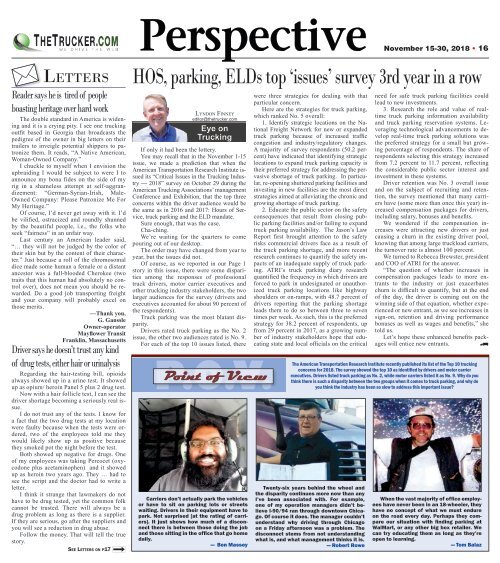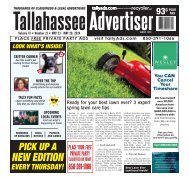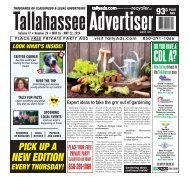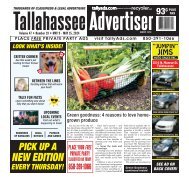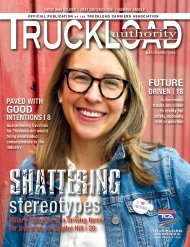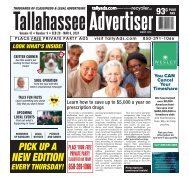The Trucker Newspaper - November 15, 2018
You also want an ePaper? Increase the reach of your titles
YUMPU automatically turns print PDFs into web optimized ePapers that Google loves.
Perspective <strong>November</strong><br />
<strong>15</strong>-30, <strong>2018</strong> • 16<br />
Letters<br />
Reader says he is tired of people<br />
boasting heritage over hard work<br />
<strong>The</strong> double standard in America is widening<br />
and it is a crying pity. I see one trucking<br />
outfit based in Georgia that broadcasts the<br />
pedigree of the owner in big letters on their<br />
trailers to inveigle potential shippers to patronize<br />
them. It reads, “A Native American,<br />
Woman-Owned Company.”<br />
I chuckle to myself when I envision the<br />
upbraiding I would be subject to were I to<br />
announce my bona fides on the side of my<br />
rig in a shameless attempt at self-aggrandizement:<br />
“German-Syrian-Irish, Male-<br />
Owned Company: Please Patronize Me For<br />
My Heritage.”<br />
Of course, I’d never get away with it. I’d<br />
be vilified, ostracized and roundly shunned<br />
by the beautiful people, i.e., the folks who<br />
seek “fairness” in an unfair way.<br />
Last century an American leader said,<br />
“… they will not be judged by the color of<br />
their skin but by the content of their character.”<br />
Just because a roll of the chromosomal<br />
dice made some human a female or a distant<br />
ancestor was a full-blooded Cherokee (two<br />
traits that this human had absolutely no control<br />
over), does not mean you should be rewarded.<br />
Do a good job transporting freight<br />
and your company will probably excel on<br />
those merits.<br />
—Thank you,<br />
G. Ganssle<br />
Owner-operator<br />
Mayflower Transit<br />
Franklin, Massachusetts<br />
Driver says he doesn’t trust any kind<br />
of drug tests, either hair or urinalysis<br />
Regarding the hair-testing bill, opioids<br />
always showed up in a urine test. It showed<br />
up as opium/ heroin Panel 5 plus 2 drug test.<br />
Now with a hair follicle test, I can see the<br />
driver shortage becoming a seriously real issue.<br />
I do not trust any of the tests. I know for<br />
a fact that the two drug tests at my location<br />
were faulty because when the tests were ordered,<br />
two of the employees told me they<br />
would likely show up as positive because<br />
they smoked pot the night before the test.<br />
Both showed up negative for drugs. One<br />
of my employees was taking Percocet (oxycodone<br />
plus acetaminophen) and it showed<br />
up as heroin two years ago. <strong>The</strong>y … had to<br />
see the script and the doctor had to write a<br />
letter.<br />
I think it strange that lawmakers do not<br />
have to be drug tested, yet the common folk<br />
cannot be trusted. <strong>The</strong>re will always be a<br />
drug problem as long as there is a supplier.<br />
If they are serious, go after the suppliers and<br />
you will see a reduction in drug abuse.<br />
Follow the money. That will tell the true<br />
story.<br />
See Letters on p17 m<br />
HOS, parking, ELDs top ‘issues’ survey 3rd year in a row<br />
Lyndon Finney<br />
editor@thetrucker.com<br />
Eye on<br />
Trucking<br />
If only it had been the lottery.<br />
You may recall that in the <strong>November</strong> 1-<strong>15</strong><br />
issue, we made a prediction that when the<br />
American Transportation Research Institute issued<br />
its “Critical Issues in the Trucking Industry<br />
— <strong>2018</strong>” survey on October 29 during the<br />
American Trucking Associations’ management<br />
Conference and Exhibition, that the top three<br />
concerns within the driver audience would be<br />
the same as in 2016 and 2017: Hours of Service,<br />
truck parking and the ELD mandate.<br />
Sure enough, that was the case.<br />
Cha-ching.<br />
We’re waiting for the quarters to come<br />
pouring out of our desktop.<br />
<strong>The</strong> order may have changed from year to<br />
year, but the issues did not.<br />
Of course, as we reported in our Page 1<br />
story in this issue, there were some disparities<br />
among the responses of professional<br />
truck drivers, motor carrier executives and<br />
other trucking industry stakeholders, the two<br />
larger audiences for the survey (drivers and<br />
executives accounted for about 90 percent of<br />
the respondents).<br />
Truck parking was the most blatant disparity.<br />
Drivers rated truck parking as the No. 2<br />
issue, the other two audiences rated is No. 9.<br />
For each of the top 10 issues listed, there<br />
Carriers don’t actually park the vehicles<br />
or have to sit on parking lots or streets<br />
waiting. Drivers in their equipment have to<br />
park. Not surprised [at the rating of carriers].<br />
It just shows how much of a disconnect<br />
there is between those doing the job<br />
and those sitting in the office that go home<br />
daily.<br />
— Ben Massey<br />
were three strategies for dealing with that<br />
particular concern.<br />
Here are the strategies for truck parking,<br />
which ranked No. 5 overall:<br />
1. Identify strategic locations on the National<br />
Freight Network for new or expanded<br />
truck parking because of increased traffic<br />
congestion and industry/regulatory changes.<br />
A majority of survey respondents (50.2 percent)<br />
have indicated that identifying strategic<br />
locations to expand truck parking capacity is<br />
their preferred strategy for addressing the pervasive<br />
shortage of truck parking. In particular,<br />
re-opening shuttered parking facilities and<br />
investing in new facilities are the most direct<br />
strategies aimed at alleviating the chronic and<br />
growing shortage of truck parking.<br />
2. Educate the public sector on the safety<br />
consequences that result from closing public<br />
parking facilities and/or failing to expand<br />
truck parking availability. <strong>The</strong> Jason’s Law<br />
Report first brought attention to the safety<br />
risks commercial drivers face as a result of<br />
the truck parking shortage, and more recent<br />
research continues to quantify the safety impacts<br />
of an inadequate supply of truck parking.<br />
ATRI’s truck parking diary research<br />
quantified the frequency in which drivers are<br />
forced to park in undesignated or unauthorized<br />
truck parking locations like highway<br />
shoulders or on-ramps, with 48.7 percent of<br />
drivers reporting that the parking shortage<br />
leads them to do so between three to seven<br />
times per week. As such, this is the preferred<br />
strategy for 38.2 percent of respondents, up<br />
from 29 percent in 2017, as a growing number<br />
of industry stakeholders hope that educating<br />
state and local officials on the critical<br />
<strong>The</strong> American Transportation Research Institute recently published its list of the Top 10 trucking<br />
concerns for <strong>2018</strong>. <strong>The</strong> survey showed the top 10 as identified by drivers and motor carrier<br />
executives. Drivers listed truck parking as No. 2, while motor carriers listed it as No. 9. Why do you<br />
think there is such a disparity between the two groups when it comes to truck parking, and why do<br />
you think the industry has been so slow to address this important issue?<br />
Twenty-six years behind the wheel and<br />
the disparity continues more now than any<br />
I’ve been associated with. For example,<br />
one of my operation managers didn’t believe<br />
I-90/94 ran through downtown Chicago.<br />
Of course it does. <strong>The</strong> manager couldn’t<br />
understand why driving through Chicago<br />
on a Friday afternoon was a problem. <strong>The</strong><br />
disconnect stems from not understanding<br />
what is, and what management thinks it is.<br />
— Robert Rowe<br />
need for safe truck parking facilities could<br />
lead to new investments.<br />
3. Research the role and value of realtime<br />
truck parking information availability<br />
and truck parking reservation systems. Leveraging<br />
technological advancements to develop<br />
real-time truck parking solutions was<br />
the preferred strategy for a small but growing<br />
percentage of respondents. <strong>The</strong> share of<br />
respondents selecting this strategy increased<br />
from 7.2 percent to 11.7 percent, reflecting<br />
the considerable public sector interest and<br />
investment in these systems.<br />
Driver retention was No. 3 overall issue<br />
and on the subject of recruiting and retention,<br />
the survey mentioned that many carriers<br />
have (some more than once this year) increased<br />
compensation packages for drivers,<br />
including salary, bonuses and benefits.<br />
We wondered if the compensation increases<br />
were attracting new drivers or just<br />
causing a churn in the existing driver pool,<br />
knowing that among large truckload carriers,<br />
the turnover rate is almost 100 percent.<br />
We turned to Rebecca Brewster, president<br />
and COO of ATRI for the answer.<br />
“<strong>The</strong> question of whether increases in<br />
compensation packages leads to more entrants<br />
to the industry or just exacerbates<br />
churn is difficult to quantify, but at the end<br />
of the day, the driver is coming out on the<br />
winning side of that equation, whether experienced<br />
or new entrant, as we see increases in<br />
sign-on, retention and driving performance<br />
bonuses as well as wages and benefits,” she<br />
told us.<br />
Let’s hope these enhanced benefits packages<br />
will entice new entrants. 8<br />
When the vast majority of office employees<br />
have never been in an 18-wheeler, they<br />
have no concept of what we must endure<br />
on the road every day. Perhaps they compare<br />
our situation with finding parking at<br />
WalMart, or any other big box retailer. We<br />
can try educating them as long as they’re<br />
open to learning.<br />
— Tom Balaz


